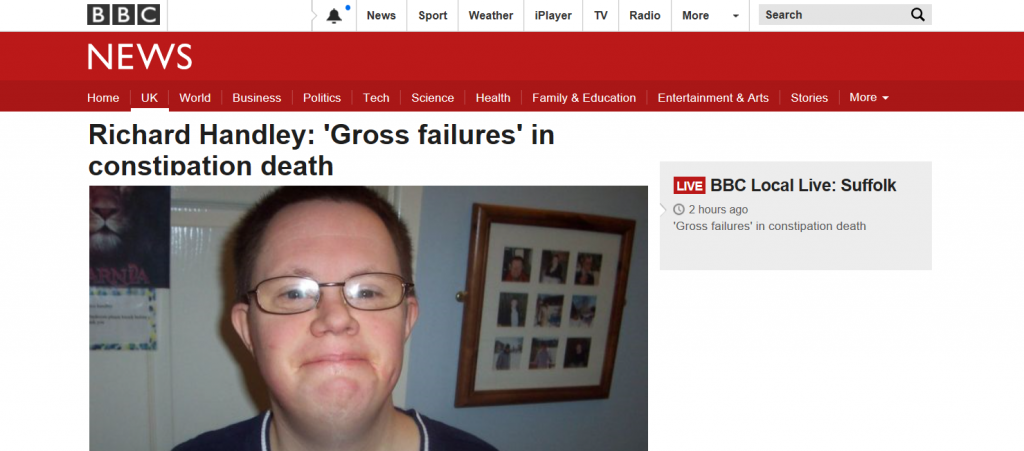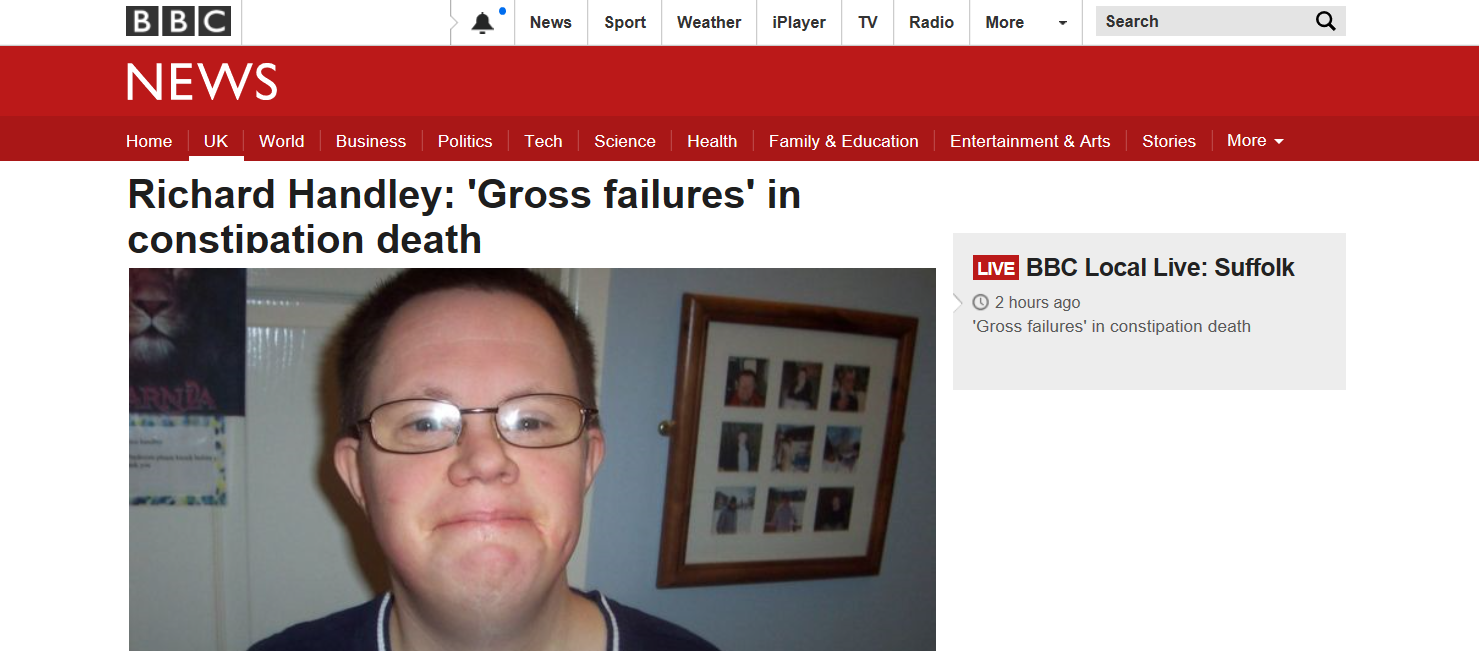BBC News reports:
A “missed opportunity” for potentially life-saving treatment contributed to the death of a man from constipation complications, an inquest has found.
Richard Handley, 33, who had Down’s syndrome, died at Ipswich Hospital on 17 November 2012.
Some 10kg (22lb) of faeces was removed from his body two days before.
Coroner Dr Peter Dean said there were “gross failures” in spotting Mr Handley was in a critical state after the surgery.
After an 11-day inquest at Ipswich Coroners’ Court, Dr Dean said an overall care co-ordinator “would have prevented this from happening” as there were a number of agencies involved in looking after Mr Handley.
Mr Handley’s mother Sheila, who gave evidence during the inquest, said outside court she was “disappointed” after the coroner’s verdict.
“With hearing about the gross failures identified and missed opportunities spoken of I find it very hard to understand how the coroner didn’t feel able to use the word ‘neglect’ in his conclusion,” she said.
“It feels to me, having heard all the evidence, that the level of the failures was such that Richard died because he was neglected. He wasn’t given the care he needed to keep him safe.”
A record of the proceeding are available on the excellent Richard Handley Inquest Twittter account.
Richard Handley was just 33 years old when he died.
Beyond Richard Handley’s unnecessary death, what are the wider lessons to be learned?
[Richard Handley] was known to Suffolk Mental Health Partnership during 1998. This merged with Norfolk and Waveney Mental Health Partnership during January 2012 and became the Norfolk and Suffolk NHS Foundation Trust. James was seen by the Community Learning Disabilities Team from 1999 to 2003 following the Care Programme Approach (CPA). His care coordinator was a Community LD Nurse. Between 2003 and 2008 [Richard Handley] was seen by a consultant psychiatrist. From 2008, the CPA was re-launched as Non CPA and [Richard Handley] remained on this pathway until his death. The Non CPA meant that [Richard Handley] did not have a formal community care coordinator. Also, it meant that he was not deemed to have complex or high risk needs and could therefore be managed by the Consultant Psychiatrist as he was thought to need medical/ medication review. His social care and primary health care needs were provided and monitored outside of the mental health trust.
How many times have we heard about inappropriate discharges from, or failure to adopt, Care Programme Approach (CPA) and a lack of care plans and care co-ordinators at Norfolk and Suffolk NHS Foundation Trust (NSFT)?
We know that the cuts at NSFT during the radical redesign were so savage that patients were discharged from CPA simply because NSFT no longer had enough suitably-qualified Band 6 nurses, having paid them to leave or down-banded them.
The Care Quality Commission has condemned the lack of care plans at NSFT for years. The management of NSFT’s typically incompetent and bureaucratic response was to create internal working and implementation groups which met for years but did little to improve the situation on the front line.
Julie Cave, chief executive of Norfolk and Suffolk NHS Foundation Trust (NSFT), said it “fully accepts” the conclusions of the coroner.
She added: “Since the publication of a serious case review in 2015, NSFT has made significant improvements to the services we provide to people with learning disabilities who also experience mental illness.”
How many times have we been promised ‘significant improvements’? Again and again and again and again.
How many more deaths?
Click on the image below to read the article in full on the BBC News website:


LivPure is the only product in the world that contains a proprietary Liver Purification and Fat-Burning Complex.With it cutting-edge formula, LivPure can rapidly detoxify the liver, promote fat burning, and improve overall liver health.
Greetings! Very useful advice in this particular article!
It is the little changes which will make the biggest changes.
Thanks for sharing!
I’m really enjoying the theme/design of your website.
Do you ever run into any web browser compatibility
problems? A handful of my blog readers have complained about my website not working correctly in Explorer but looks great in Firefox.
Do you have any suggestions to help fix this issue?
https://totomidas.store
https://tinyurl.com/best-ai-conversation-mobile
https://n9kini.com
https://gnmedrol.com
https://totomidas.store
https://tinyurl.com/best-ai-conversation-mobile
Hello There. I discovered your blog the use of msn.
This is a really neatly written article. I will make sure to bookmark it and come back to read extra of your helpful
info. Thanks for the post. I will definitely return.
https://astina333.digital
I blog quite often and I seriously appreciate your information. This great article has really peaked my interest. I will take a note of your site and keep checking for new details about once a week. I subscribed to your Feed as well.
Also visit my page: https://casinovavada.blogspot.com/2021/12/blog-post.html
best online pharmacies in mexico: Mexican Pharmacy Online – mexico drug stores pharmacies
PBN sites
We shall establish a structure of PBN sites!
Benefits of our privately-owned blog network:
We perform everything so GOOGLE DOES NOT grasp that this A self-owned blog network!!!
1- We purchase web domains from separate registrars
2- The main site is hosted on a VPS server (Virtual Private Server is high-speed hosting)
3- The rest of the sites are on different hostings
4- We allocate a separate Google account to each site with confirmation in Search Console.
5- We develop websites on WP, we don’t employ plugins with aided by which Trojans penetrate and through which pages on your websites are generated.
6- We never duplicate templates and employ only individual text and pictures
We refrain from work with website design; the client, if desired, can then edit the websites to suit his wishes
indian pharmacies safe https://indiaph24.store/# pharmacy website india
online pharmacy india
?»?best mexican online pharmacies: mexico pharmacy – mexican pharmacy
mexico drug stores pharmacies: Online Pharmacies in Mexico – buying from online mexican pharmacy
best india pharmacy http://indiaph24.store/# best online pharmacy india
online shopping pharmacy india